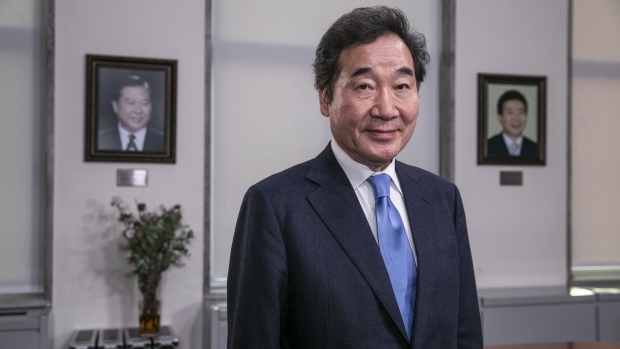Mar 9, 2021
South Korea Ruling Party Leader Resigns in Likely Presidency Bid
, Bloomberg News

(Bloomberg) -- South Korea’s ruling Democratic Party leader resigned the party post he held for seven months to pave the way for a possible bid to succeed President Moon Jae-in in the 2022 presidential election.
Lee Nak-yon, a top contender in Moon’s progressive camp, said Tuesday he was resigning as party leader. The move is a prerequisite under the party’s constitution that says any leaders intending to run in its presidential primary must resign their posts at least one year before a presidential election.
“It was truly an honor to serve as party leader,” Lee said at a news conference. “I will prepare a vision for the future that would enable Korea to become the world’s leading country where we can live well, together.”
Moon’s single, five-year term ends next year, with the election set for March 9, 2022. Lee Nak-yon, considered a moderate in economic and foreign policy, is in a battle for succession in the progressive camp with Lee Jae-myung, the governor of the most populous province who has pushed to make the country Asia’s first to introduce universal basic income.
While no top contender has emerged from the conservative opposition, former Prosecutor General Yoon Seok-youl, has seen his support rate climb after a protracted battle with Moon about stripping prosecutors of investigative powers. The clash resulted in Yoon resigning last week in protest and the public siding with him, according to opinion surveys.
A survey released Monday by the Korea Society Opinion Institute showed Yoon as the top pick for president, with 32.4% of respondents choosing him as “appropriate” to succeed Moon. Gyeonggi Governor Lee Jae-myung was at 24.1% and Lee Nak-yon at 14.9%.
When asked last week in an interview with Bloomberg about a potential run, Lee Nak-yon said: “I will not avoid responsibility.”
Lee Nak-yon served as Moon’s first prime minister until January 2020 and recently played a prominent role in putting together Covid-19 relief packages. He also said in the interview that he wants to see a plan encouraging voluntary financial contributions from corporations, in return for government incentives like tax cuts, to narrow income gaps and help those whose lives have been upended by the pandemic.
The former prime minister must walk a delicate line if he seeks the presidency, embracing progressives policies that appeal to the base and attract voters disenchanted with Moon. The president’s support levels are now hovering near record lows amid anger among many in the public who feel he hasn’t done enough to tackle runaway real estate prices and erase income inequality gaps that rank among the highest in the developed world.
©2021 Bloomberg L.P.







